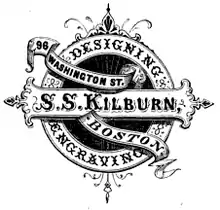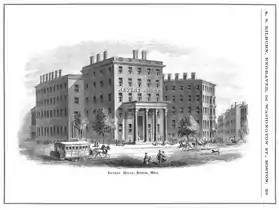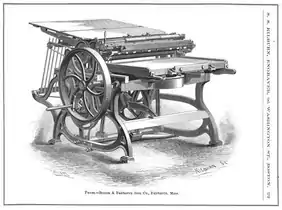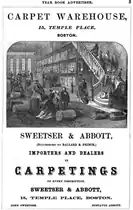Samuel Smith Kilburn (1831—1903) was an engraver in Boston, Massachusetts, in the 19th century. He trained with Abel Bowen. Kilburn's work appeared in popular periodicals such as Gleason's Pictorial. His business partners included Richard P. Mallory (Kilburn & Mallory)[1][2] and Henry C. Cross.[3] For many years Kilburn worked at 96 Washington Street in Boston (c.1852-1871);[4] he lived in Newton, Massachusetts.[5] Examples of his work are in the collections of the Boston Athenaeum[6] and the Museum of Fine Arts Boston.[7]
Image gallery
 S.S. Kilburn, engraver, Washington St., Boston, ca.1865
S.S. Kilburn, engraver, Washington St., Boston, ca.1865 Kilburn's Specimens of Designing and Engraving on Wood, ca.1865
Kilburn's Specimens of Designing and Engraving on Wood, ca.1865 Revere House, Boston, ca.1865
Revere House, Boston, ca.1865 "Press-- Boston & Fairhaven Iron Co., Fairhaven, Mass.," ca.1865
"Press-- Boston & Fairhaven Iron Co., Fairhaven, Mass.," ca.1865 Ad for Sweetser & Abbott, carpet dealers, Temple Place, Boston, 1868
Ad for Sweetser & Abbott, carpet dealers, Temple Place, Boston, 1868
Further reading
Works by Kilburn
- S.S. Kilburn. Specimens of designing and engraving on wood. Boston: ca.1865-1867.
- Works with engraving by Kilburn
- My teacher's gem. Boston: Lee & Shepard, 1863
- Oliver Optic's Magazine
- Our Young Folks
Works about Kilburn
References
- ↑ Boston Directory. 1852
- ↑ American Broadsides and Ephemera, Series 1, no. 27665
- ↑ New England historical and genealogical register. 1904.
- ↑ Boston Directory. 1852
- ↑ Directory of the town of Newton. 1871
- ↑ "Boston Athenaeum".
- ↑ "MFA Boston". Archived from the original on 2007-02-24.
External links
Wikimedia Commons has media related to Samuel Smith Kilburn.
- Works by Samuel Smith Kilburn at Project Gutenberg
- Works by or about Samuel Smith Kilburn at Internet Archive
- Not Against Type, blog by Larry Thompson. Image of Thompson's 2009 impression of Kilburn's change of address woodblock. Nov. 25, 2009.
- New York Public Library. Items related to Kilburn.
This article is issued from Wikipedia. The text is licensed under Creative Commons - Attribution - Sharealike. Additional terms may apply for the media files.